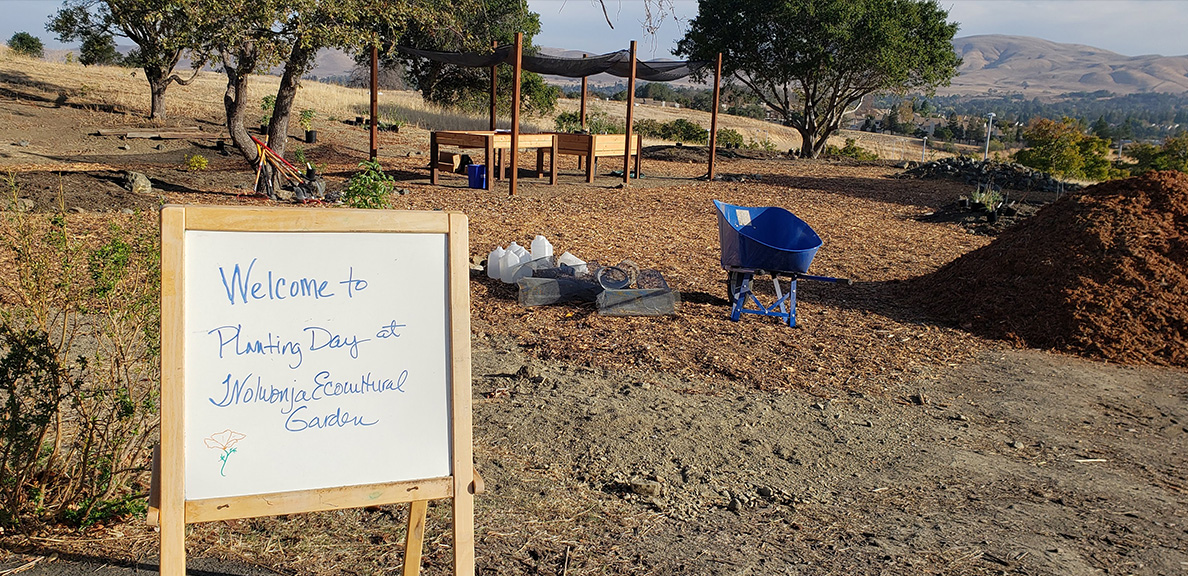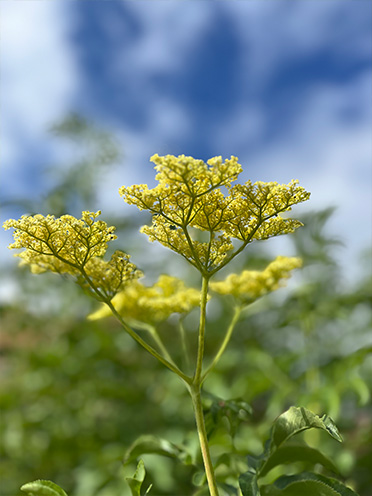
U.S. Environmental Protection Agency Visits Concord Center
BY Kimberly Hawkins
PHOTOGRAPHY BY Kathy Cutting
May 21, 2024
The U.S. Environmental Protection Agency (EPA) visited Cal State East Bay’s Concord Center on Thursday, May 23 to check in on the progress of the Climate Resilience Initiative, which includes the Wolwonja Ecocultural Garden and Galindo Creek Field Station.
The EPA awarded a $915,786 grant to support Cal State East Bay’s work on the 6,000-square-foot garden, which lies at the foot of Mount Diablo, overlooking the northern East Bay. The area, part of the Concord Center, houses an abundance of wildlife — including birds, deer, coyotes and bobcats. EPA-related scientific studies are being conducted, including soil, water and air pollution monitoring. After four years of restoration, comparisons of the change in habitat, both in the garden and within the Galindo Creek Field Station, which is also on the Concord campus, will inform how climate adaptation is addressed.
“We are so lucky to have access to this much land teeming with life right at our fingertips—or feet! I also look forward to EPA understanding the connection to the sacred space of the Indigenous people, Tuushtak, or what is known as Mt. Diablo,” said Kathy Cutting, Concord Campus’ administrative support coordinator, who is working with Indigenous partners on the garden design. “We are literally at the base of the mountain, which means so much to the Ohlone people. It's a very special place.”
For more than 30,000 years, the land upon which the Concord Center resides was home to Indigenous peoples, including the Ohlone and Bay Miwok tribes, who lived sustainably for generations. The garden's name, Wolwonja, means “mountain” in the language of the Bay Miwok.
The Climate Resilience Initiative’s mission is to educate the public on sustainability and climate resilience methods based on Traditional Ecological Knowledge and the vision of the Indigenous communities. It is an accessible public and welcoming space that will showcase how to sustainably grow native foods and medicinal and utilitarian plants. Those plants, which include acorns, chia seeds and yampah, will then be made available to local Indigenous communities for ceremonies, ancestral crafts and revitalizing their Indigenous foodways. Plant identification tags will be written in Latin, English and Chochenyo. QR codes will allow visitors to hear the Chochenyo language as well as stories of the plants and their roles in Ohlone daily life.
“Sustainability with regard to food is important,” said Cutting. “For example, when people understand what it takes to grow food in terms of resources used like water, fuel, and inputs such as fertilizer for foods you find in the grocery store, compared to what you can grow in a pot on your patio, the choices you can make play an important role in climate adaptation.”
The Indigenous garden, which was started in 2022 with the help of a $50,000 grant from the National Association of Conservation Districts, has been a labor of love for students, staff, faculty and the community who have come together to create, build and plant. Faculties in the departments of nursing, earth and environmental sciences, ethnic studies, anthropology, geography and environmental studies are all working to incorporate the project into their curriculum.
“It is possible to grow native California plants in a sustainable manner, and there are Indigenous Californians committed to maintaining their ancestral land management practices,” said Ethnic Studies Professor Enrique Salmón. “I would like as many Cal State East Bay faculty, staff and students to become familiar with the project and to figure out how to get involved.”
In addition to learning and community-building, the EPA grant is allowing for paid consultation with Vincent Medina and Louis Trevino — owners of Cafe Ohlone, an Indigenous restaurant dedicated to the authentic culinary traditions of the Ohlone. The restaurant is located on the UC Berkeley campus and will use items grown from the ecocultural garden in its traditional Ohlone dishes.
“The garden is within our East Bay homeland, and we work to promote the restoration of all things native to the East Bay, including plant life,” said Vincent Medina and Louis Trevino, co-founders of Cafe Ohlone. “Environmental justice and justice for our East Bay community are inextricably connected.”
(Edited August 13, 2024)

Elderberry ( čišnay ) in the garden
Topics
Share this story